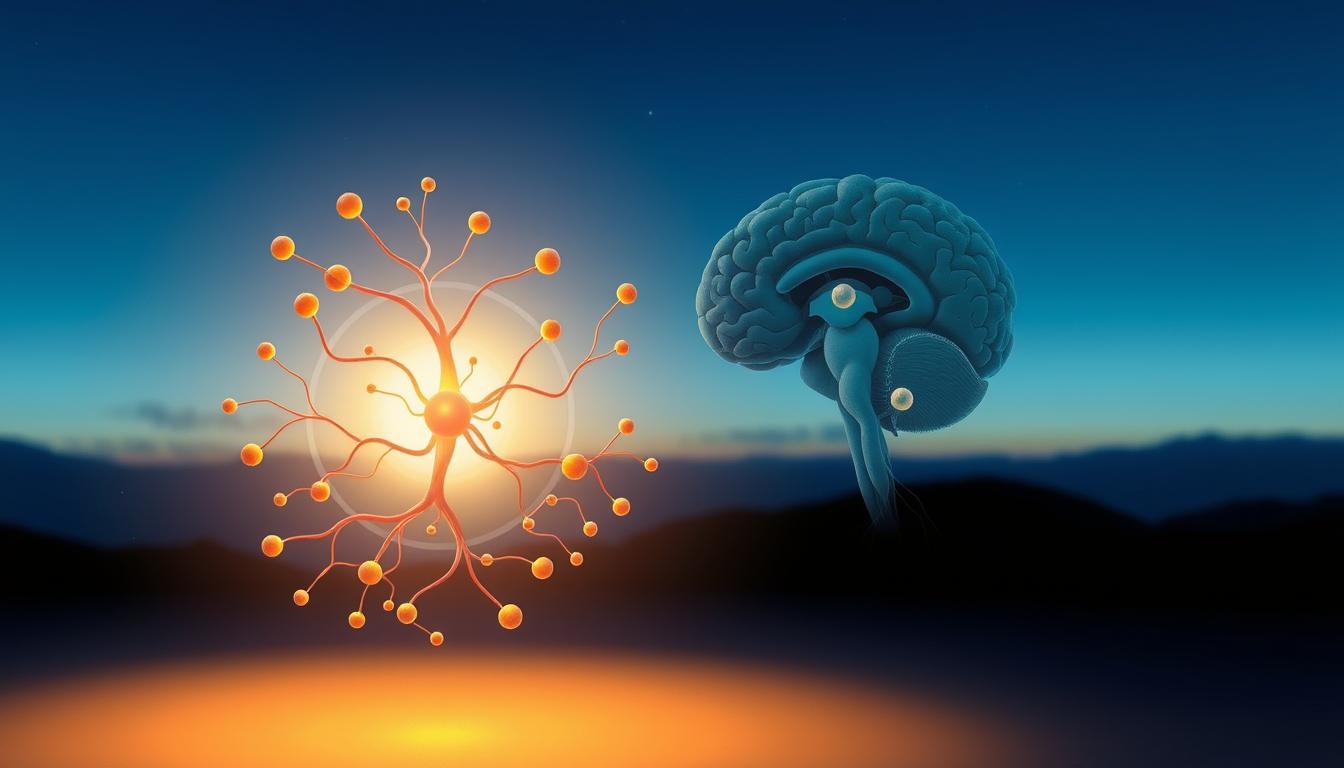Your body has a 24-hour schedule for feeling awake and sleepy. This schedule is called your circadian rhythm. It works with your hormone glands to keep you healthy.
Your biological clock is like a conductor for your hormones. It controls when you get energy in the morning, sleep at night, and repair during sleep. This system is perfectly timed, thanks to millions of years of evolution.
Knowing how your circadian rhythm affects your endocrine system can change your health routine. When these systems work well together, you sleep better, have more energy, and feel balanced.
Making small changes to your daily routine can greatly affect your timing system. Let’s see how you can align with your body’s natural rhythms.
Understanding Circadian Rhythm
Deep in your brain, a timekeeper works hard every day. It keeps your body in sync with the world. Knowing how it works can change your life.
Definition and Mechanisms
Your circadian rhythm is a 24-hour cycle that controls your alertness and hunger. It’s run by a tiny part of your brain called the SCN. Think of it as your body’s master control.
The SCN has about 20,000 nerve cells that work together. They send signals and messengers to keep your body on time. This works even when it’s dark.
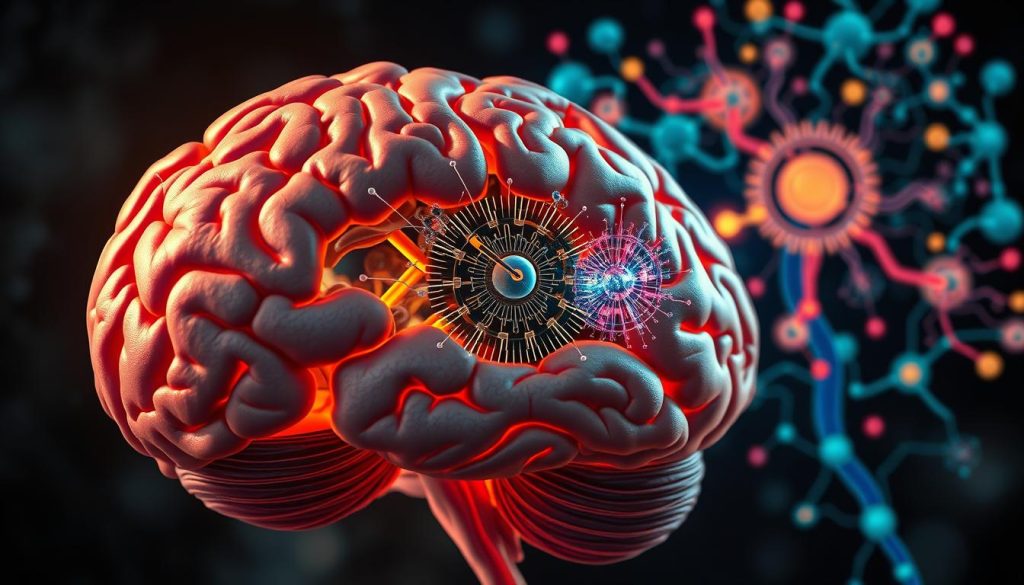
- Clock genes produce proteins that build up during the day
- These proteins break down at night, creating a natural cycle
- Light sensors in your eyes send signals to the SCN
- The SCN then releases hormones like melatonin and cortisol
- These hormones influence your sleep-wake patterns
Your body gets ready for sleep and wake-up times. This helps you smoothly switch between being awake and asleep.
Importance in Daily Life
Your biological clock affects every part of your day. It works from morning to night, controlling your body.
Here are some ways your circadian rhythm affects you:
- Morning alertness peaks around 9 AM for most people
- Body temperature reaches its lowest point around 6 AM
- Afternoon energy dips typically occur between 1-3 PM
- Evening melatonin production begins around 9 PM
- Deep sleep phases occur most frequently before midnight
Working with your natural rhythms improves your day. You’ll be more focused and feel better during workouts.
Knowing about your biological clock helps with jet lag and shift work. It shows why adjusting to new schedules is hard. This knowledge helps you make better choices for your health and life.
The Endocrine System at a Glance
The endocrine system is like a messaging service for your body. It uses hormones to keep everything running smoothly. These hormones travel through your blood to reach organs and tissues, giving them important instructions.
This system is amazing because it manages so many things at once. It helps control your sleep, metabolism, and more. It makes sure your body works together perfectly.
Key Glands and Hormones
There are many important glands in your endocrine system. The pineal gland helps you sleep by making melatonin. The hypothalamus connects your nervous and endocrine systems.
The pituitary gland is called the “master gland” because it controls other glands. It makes growth hormone and tells other glands what to do. Your thyroid gland controls your metabolism, and your adrenal glands help with stress and energy.
- Pancreas – produces insulin for blood sugar control
- Ovaries and testes – create sex hormones
- Parathyroid glands – regulate calcium levels
- Thymus – supports immune system development
Each gland plays a part in keeping your body balanced.
How the Endocrine System Works
The endocrine system uses a feedback loop to keep balance. When hormone levels change, your glands adjust their production. This keeps your hormones in check.
For example, when you’re stressed, your cortisol levels go up. Your hypothalamus and pituitary gland notice this and slow down cortisol production. This keeps hormone levels stable.
Your endocrine system also responds to your environment. Light, food, and exercise affect hormone production. This lets your body adapt to changes while keeping essential functions going.
Unlike your nervous system, hormonal regulation is slower but has lasting effects. Some hormones work quickly, while others take longer. This allows your body to handle both immediate and long-term needs.
Connection Between Circadian Rhythm and Hormones
Your body works like a well-timed orchestra. Hormones rise and fall with your circadian rhythm. This ensures the right messengers are there at the right times. It affects your energy and stress handling.
This timing system has evolved over millions of years. It helps us thrive in a 24-hour world. When it’s working, you’re alert during the day and sleepy at night. But, disruptions can lead to fatigue, mood swings, or trouble focusing.
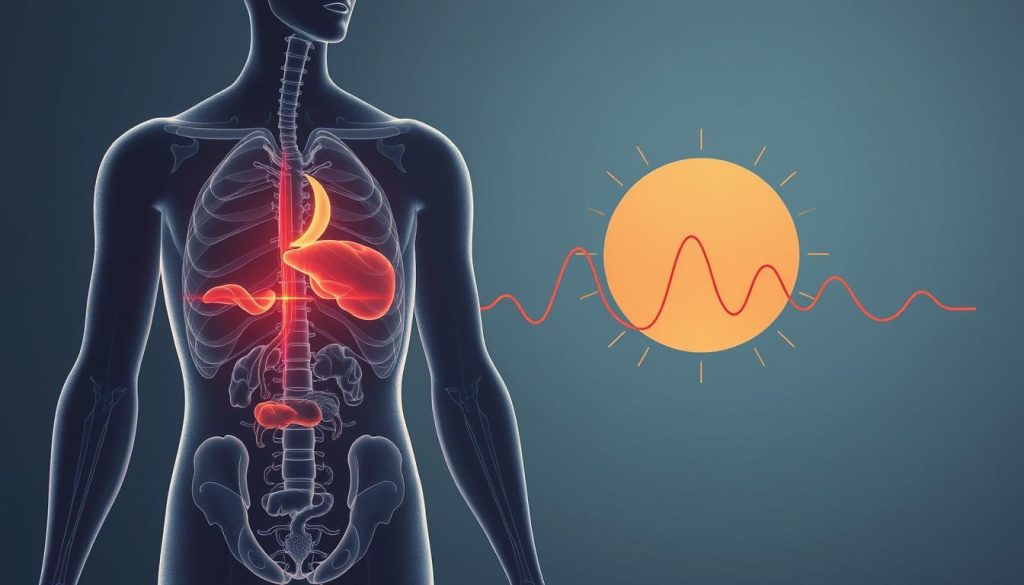
Daily Hormone Changes
Every day, your hormone levels change to meet your body’s needs. Cortisol, your stress hormone, peaks at 8 AM. This gives you the energy to start your day.
Cortisol levels drop as the day goes on, hitting a low at midnight. This helps you get ready for sleep. Other hormones also follow a schedule, creating a complex but organized system.
Growth hormone spikes during deep sleep. Insulin sensitivity changes throughout the day. These changes are not random but are carefully timed to meet your body’s needs. Knowing these patterns can help you plan your day better.
Light’s Impact on Hormone Control
Light is the key that starts your hormonal symphony. Morning light wakes you up by triggering cortisol release. It also stops melatonin production, your sleep hormone.
As daylight fades, melatonin starts to rise, getting you ready for sleep. Artificial light, especially blue light from screens, can mess with this natural process.
The timing of light exposure is crucial. Evening light can shift your hormonal schedule, making it hard to sleep and wake up. This is why many struggle with sleep after late nights of screen time.
Your hormones quickly respond to light changes. This shows how fast external cues can affect your body. This sensitivity helped our ancestors adapt but can be a challenge today.
How Circadian Rhythm Affects Sleep
Our body has an internal timing system that controls sleep. It affects our health in many ways. The sleep-wake cycle is the most obvious part of this system.
This cycle tells us when to be awake and when to sleep. Light and darkness play big roles. They signal to our body when it’s time to rest or be active.
Sleep Cycle and Hormonal Production
During sleep, our body makes important hormones. Melatonin is one of them. It’s like a natural sleep signal made by the pineal gland in our brain.
Melatonin levels go up in the evening and stay high at night. Growth hormone is another hormone that follows a pattern. It’s released mostly during deep sleep, especially in the first half of the night.
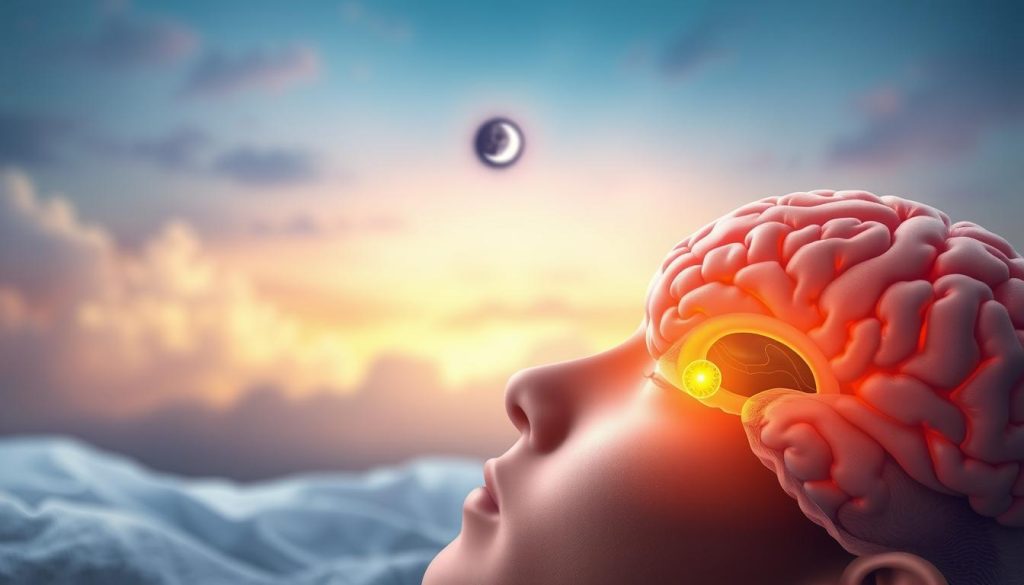
Cortisol, our stress hormone, works differently. Its levels drop at bedtime and stay low during the night. This helps our body rest and recover.
In the morning, cortisol levels rise. This helps us wake up and feel alert. These hormonal changes are balanced in a natural way.
Consequences of Disrupted Sleep Patterns
When our sleep schedule doesn’t match our natural rhythm, problems can arise. Irregular bedtimes can mess up melatonin production. This makes it hard to fall asleep and stay asleep.
Shift workers and frequent travelers often face these challenges. Their sleep-wake cycle gets out of sync with their body’s natural clock. This can lead to high cortisol levels in the evening.
Poor sleep patterns can also affect our metabolism. Our body may not process sugar right when sleep is disrupted. This increases the risk of diabetes and weight gain. Our immune system also gets weaker with poor sleep.
Long-term sleep disruption can cause serious health problems. These include heart disease, depression, and memory issues. Our body needs consistent sleep timing to keep hormone balance right. Regular sleep schedules help keep our circadian rhythm healthy and strong.
Impact of Lifestyle on Circadian Rhythm
Everyday choices about food and exercise greatly affect your circadian rhythm. These actions send signals to your body’s internal clock. This can either help or harm its natural function. Knowing this helps you make better choices for your health.
Your lifestyle patterns interact with your circadian system. Consistent habits lead to better hormone balance and energy. But, irregular patterns can upset your whole system.
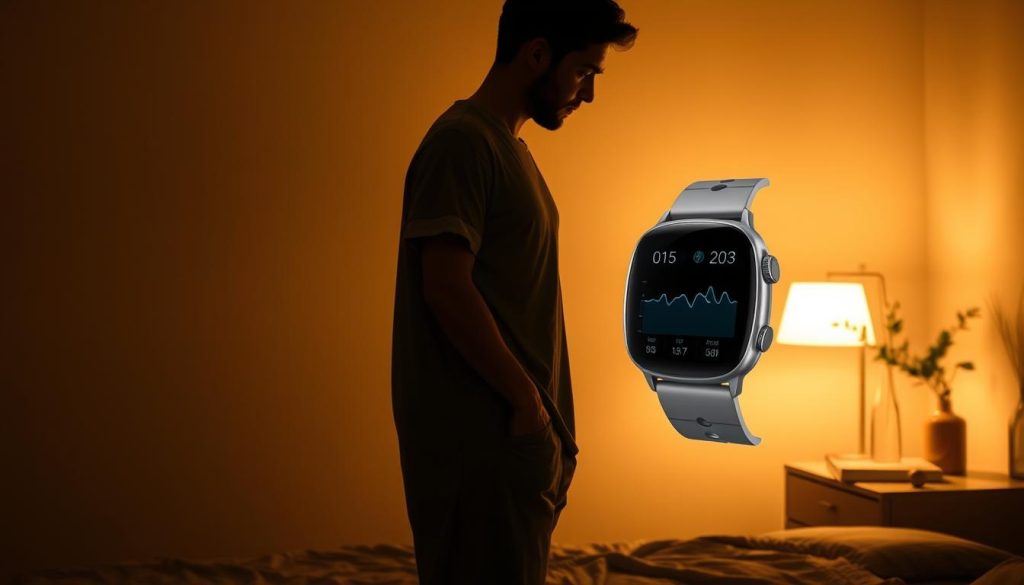
Diet and Its Timing
When you eat is as important as what you eat for your circadian health. Your digestive system works best during the day. This affects how your body uses nutrients.
Morning meals align with your body’s natural rhythm. Your body is most sensitive to insulin in the morning. This makes breakfast a good time for complex carbs.
Eating late at night goes against your body’s natural rhythm. It expects to slow down in the evening, not digest big meals. This can cause:
- Poor blood sugar control
- Increased fat storage
- Disrupted sleep quality
- Reduced morning appetite
Sticking to a regular meal schedule helps keep your circadian rhythm stable. Eat your biggest meal when your metabolism is highest. This helps with weight management and sleep.
Exercise and Hormonal Responses
Exercise is a key regulator of your circadian rhythm. The timing of your workouts affects hormone levels and sleep. Morning workouts match your body’s natural cortisol levels.
Early workouts have many benefits. They help set your wake-up signals and improve melatonin production. Your body temperature also rises, keeping you alert.
Evening workouts need careful timing. They can interfere with sleep by:
- Elevating core body temperature
- Increasing stress hormone levels
- Stimulating the nervous system
- Delaying melatonin release
Try to finish intense exercise three hours before bed. This allows your body to cool down and hormone levels to stabilize. Light stretching or yoga is okay closer to bedtime.
Regular exercise timing helps your body anticipate patterns. This optimizes your metabolism and supports healthy circadian function. Hormonal responses become more efficient with consistent exercise times.
Health Conditions Related to Circadian Disruption
When our internal clock gets out of sync, serious health problems can follow. The field of chronobiology has found links between disrupted rhythms and many medical conditions. These issues affect millions, especially those with irregular schedules or poor sleep habits.
Understanding these links shows why healthy sleep patterns are key. When our body’s timing system is off, it affects our whole system.
Sleep Disorders
Sleep disorders are clear signs of circadian rhythm problems. They come from internal clocks that don’t match our daily lives.
Some common sleep disorders include:
- Delayed sleep phase syndrome – trouble falling asleep and waking up on time
- Advanced sleep phase syndrome – waking up too early
- Non-24-hour sleep-wake disorder – sleep patterns shift later each day
- Shift work sleep disorder – trouble adjusting to work schedules
These disorders don’t just mess with sleep. They also affect hormone production, leading to fatigue, mood swings, and brain fog.
Irregular sleep affects more than just tiredness. It also impacts focus, decision-making, and emotional balance.
Metabolic Disorders
Metabolic disorders are another serious issue linked to disrupted rhythms. Our body’s metabolism changes throughout the day. This affects how we process nutrients and manage blood sugar.
When our internal clocks are off, several metabolic problems can occur:
- Insulin resistance and changes in glucose metabolism
- Problems with appetite regulation and hormones like leptin and ghrelin
- Increased risk of obesity and weight gain
- Higher risk of type 2 diabetes
- Increased risk of heart disease
Shift workers and those with irregular sleep are at higher risk. Even with the same diet and exercise, they often struggle with weight and metabolic health.
This is why fixing circadian rhythm problems is crucial for treating sleep and metabolic disorders. Improving one area often helps the other, showing the connection between these systems.
Strategies to Harmonize Your Circadian Rhythm
Creating a good balance between your body’s natural rhythm and daily life is key. Simple changes can have a big impact. Your body likes consistent signals that match its natural timing.
Focus on two main areas: regular sleep patterns and the right amount of light during the day. Both help your body produce hormones and stay in sync with time.
Establishing a Sleep Routine
A consistent sleep schedule is the base of good circadian health. It’s not just about going to bed and waking up at the same time every day. Your body needs clear signs to switch from being awake to sleeping.
Set a fixed bedtime and wake time, even on weekends. This helps your internal clock stay on track. Before bed, do things that calm you down, like dimming lights or avoiding screens.
Your bedroom should be cool, dark, and quiet. Use blackout curtains or an eye mask to block out light. A good mattress and pillows also help you sleep better.
The Importance of Natural Light
Natural light is your body’s main time-keeping signal. Morning light helps your body produce the right hormones. This prepares you for melatonin production at night.
Try to spend 15-30 minutes outside in the morning. If that’s not possible, use a light therapy device. Morning light helps keep your circadian clock in sync.
It’s also important to manage light in the evening. Blue light from screens can make it hard to fall asleep. Use blue light filtering glasses or warm-toned lighting in the evening.
Other ways to support your circadian rhythm include:
- Keeping meal times consistent to support your metabolism
- Exercising at the same time each day, best in the morning or afternoon
- Not drinking caffeine after 2 PM to avoid sleep problems
- Starting to wind down 1-2 hours before bed
- Using dim, warm lighting in the evening to help your body produce melatonin
Small, consistent changes are often more effective than big changes. Start with one or two strategies and add more as you get better. This way, you can keep your circadian rhythm in balance for the long term.
Future Research Directions
The field of circadian science is growing fast. Scientists worldwide are finding new things that could change health and medicine. These discoveries aim to bring treatments that fit our unique body clocks.
Emerging Studies on Circadian Biology
Researchers are looking into how genes influence our sleep patterns. Some people wake up early, while others stay up late. This research shows why one schedule doesn’t fit all.
They’re also studying how our internal clocks change with age. This helps explain why older adults sleep differently. It could lead to better sleep treatments for the elderly.
Potential Therapeutic Applications
Doctors are excited about timing treatments with our body rhythms. They’re testing if giving medicine at the right time makes it more effective. This could improve cancer treatments, heart meds, and even surgery.
New wearable devices track our personal circadian patterns. These tools help us optimize our daily routines for better health. Light therapy is also showing promise for treating depression and sleep issues.
As chronobiology research grows, we’re moving toward treatments that work with our natural rhythms. This personalized approach could change healthcare in the next few decades.

